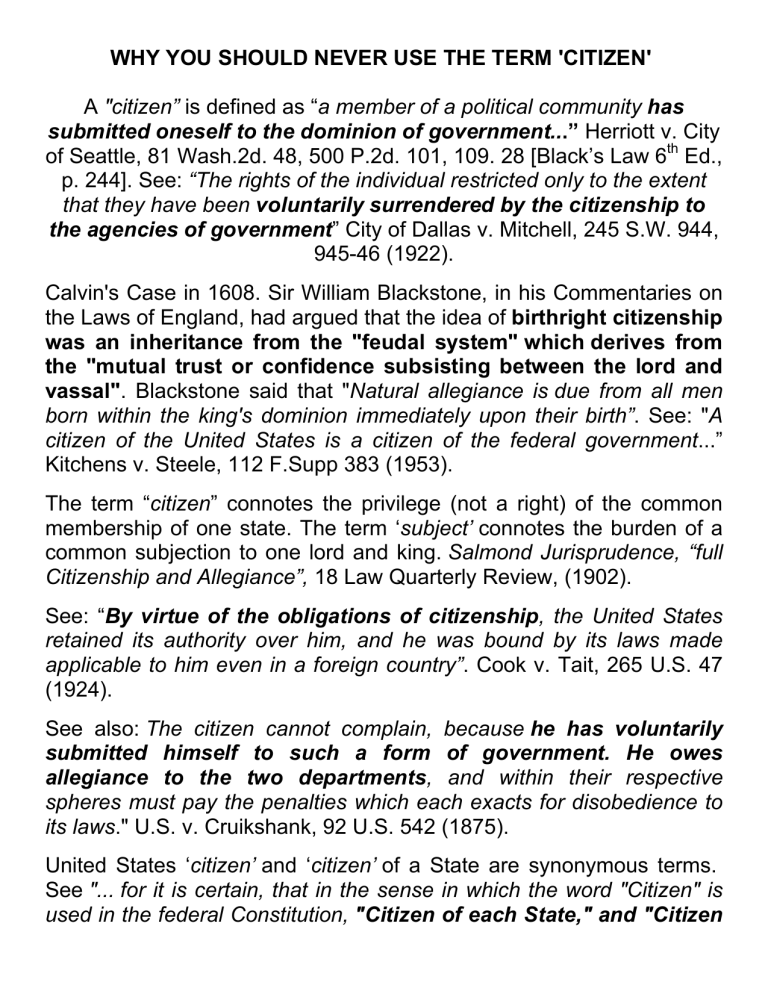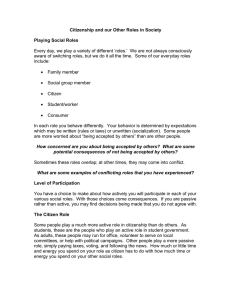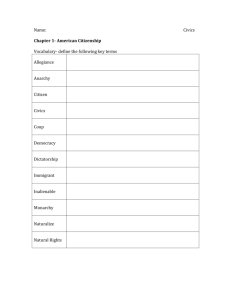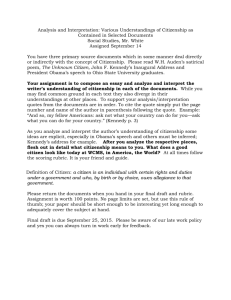
WHY YOU SHOULD NEVER USE THE TERM 'CITIZEN' A "citizen” is defined as “a member of a political community has submitted oneself to the dominion of government...” Herriott v. City of Seattle, 81 Wash.2d. 48, 500 P.2d. 101, 109. 28 [Black’s Law 6th Ed., p. 244]. See: “The rights of the individual restricted only to the extent that they have been voluntarily surrendered by the citizenship to the agencies of government” City of Dallas v. Mitchell, 245 S.W. 944, 945-46 (1922). Calvin's Case in 1608. Sir William Blackstone, in his Commentaries on the Laws of England, had argued that the idea of birthright citizenship was an inheritance from the "feudal system" which derives from the "mutual trust or confidence subsisting between the lord and vassal". Blackstone said that "Natural allegiance is due from all men born within the king's dominion immediately upon their birth”. See: "A citizen of the United States is a citizen of the federal government...” Kitchens v. Steele, 112 F.Supp 383 (1953). The term “citizen” connotes the privilege (not a right) of the common membership of one state. The term ‘subject’ connotes the burden of a common subjection to one lord and king. Salmond Jurisprudence, “full Citizenship and Allegiance”, 18 Law Quarterly Review, (1902). See: “By virtue of the obligations of citizenship, the United States retained its authority over him, and he was bound by its laws made applicable to him even in a foreign country”. Cook v. Tait, 265 U.S. 47 (1924). See also: The citizen cannot complain, because he has voluntarily submitted himself to such a form of government. He owes allegiance to the two departments, and within their respective spheres must pay the penalties which each exacts for disobedience to its laws." U.S. v. Cruikshank, 92 U.S. 542 (1875). United States ‘citizen’ and ‘citizen’ of a State are synonymous terms. See "... for it is certain, that in the sense in which the word "Citizen" is used in the federal Constitution, "Citizen of each State," and "Citizen of the United States," are convertible terms; they mean the same thing; for the "Citizens of each State are entitled to all Privileges and Immunities of Citizens in the several States," and "Citizens of the United States" are, of course, Citizens of all the United States." [44 Maine 518 (1859) Hathaway, J. dissenting]; See also: "... the term 'citizen,' in the United States, is analogous to the term "subject" in the common law; the change of phrase has resulted from the change in government. ... he who before was a "subject of the King" is now a “citizen of the State."State v. Manuel, 20 N.C. 144 (1838) quoted in 14 C.J.S. 4. “Presumptions concerning citizenship” under 3C AmJur 2d 204, sec. 2677 means “As a general rule, it is presumed, until the contrary is shown, that every person is a citizen of the country in which he or she resides.[1] Furthermore, once granted, citizenship is presumably retained unless voluntarily relinquished,[2] and the burden rests upon one alleging a change of citizenship and allegiance to establish that fact. Consequently, a person born in the United States is presumed to continue to be a citizen until the contrary is shown, and where it appears that a person was once a citizen of a particular foreign country, even though residing in another, the presumption is that he or she still remains a citizen of such foreign country, until the contrary appears”. I am classified as a “citizen of Heaven”, [“but our citizenship is in heaven..” Philippians 3:20] based on my religious beliefs which outweighs any government interest. Callahan v. Woods, 736 F. 2d 1269 (1984) U.S. v. Seeger, 380 U.S. 163 (1965); Borden v. State, 11 Ark.527 (1851), 44 Am. Dec. 21 and claim my Right to the Freedom, free exercise, and expression of Religion defined U.S. Const., Amend I, “Congress shall make no law respecting an establishment of religion, or prohibiting the free exercise thereof.” Hamilton v. Regents, 293 U.S. 245, 262 (1934); Cantwell v. Connecticut, 310 U.S. 296 (1940); “allegiance cannot be due to two sovereigns” (Talbot v. Janson, 3 U.S. 133 (1795). See: “No one can serve two masters” Matthew 6:24, Luke 16:13;“We must obey God rather than man” Acts 5:29; Maxim: “That which is against Divine Law is repugnant to society and is void” The U.S. Supreme Court has declared that “Citizenship is a membership into political society...” Luria v. U.S. 231 U.S. 9 (1913); U.S. v. Polzin, 48 F.Supp. 476 (1942)) which creates “reciprocal obligations”, “Allegiance and protection is a compensation for the other”. Minor v. Happersett, 88 U.S. 162 (1874). The Supreme Court has ruled that no government may dictate a party’s choice of political affiliations. American Jurisprudence 2d, Constitutional law, sec. 546, “Forced and Prohibited Associations”; International UDHR, Art. 20(2) “No one may be compelled to belong to an association”. · Citizenship is legal and political, not lawful and natural; · Citizenship is contractual and consensual, not moral; · Citizenship is a voluntary membership, not a mandatory requirement; · Citizenship is artificial; “Allegiance and citizenship, differ, indeed, in almost every characteristic. Citizenship is the effect of compact; allegiance is the offspring of power and necessity. Citizenship is a political tie; allegiance is a territorial tenure. Citizenship is the charter of equality; allegiance is a badge of inferiority. Citizenship is constitutional; allegiance is personal. Citizenship is freedom; allegiance is servitude. Citizenship is communicable; allegiance is repulsive. Citizenship may be relinquished; allegiance is perpetual. With such essential differences, the doctrine of allegiance is inapplicable to a system of citizenship; which it can neither serve to control, nor to elucidate. And yet, even among the nations, in which the law of allegiance is the most firmly established, the law most pertinaciously enforced, there are striking deviations that demonstrate the invincible power of truth, and the homage, which, under every modification of government, must be paid to the inherent rights of man”. Talbot v. Janson, 3 U.S. 133 (1795). Domicile does not create the citizenship or jurisdiction of a party. “It is citizenship, and not the residence, of the party, that confers jurisdiction”, Haskell v. Bailey, 63 F. 873 (1894); Bank of U.S. v. Deveaux, 5 Cranch 61, 86-87, 91, 3 L.Ed. 38 (1809). "Merely being native born within the territorial boundaries of the United States of America does not make such an individual a ‘citizen of the United States’ subject to the jurisdiction of the 14th Amendment." Elk v Wilkins, Neb (1884), 5s.ct.41, 112 U.S. 99, 28 L. Ed. 643. The courts have repeatedly declared, “Citizenship” and “residence” are not convertible terms. See: “Prima facie a citizen of the state where he resides cannot arbitrarily be excluded by such state, but that he does not become a ‘citizen of the state’ against his will, and contrary to his purpose and intention to retain an already acquired citizenship elsewhere. The 14thamendment is a restraint on the power of the state, but not on the right of the person to choose and maintain his citizenship or domicile”. Sharon v. Hill, 26 F. 337 (1885). NO RIGHTFUL CITIZENSHIP UNDER THE 14TH AMENDMENT The 14th Amendment has been used to create a ‘fiction’, ‘en legis, as a “legal / Juridical person” and to subdue American freedom through administrative regulation, namely, a "privilege" which can be regulated to any degree, including the alteration or even the revocation of that privilege. Since the statutory status of "citizen of the United States, subject to the jurisdiction thereof" (1866 Civil Rights Act) is one of privilege and not of Right, and mandates that both Congress and the several States take measures to protect these new "subjects", both the Federal and State governments are mandated to protect the privileges and immunities of ONLY these "citizens of the United States". Hale v. Henkel, 201 U.S. 43 (1906). Technically there is no rightful citizenship that may be held under the current system via the 14th Amendment. It is only “nationality” cannot be taken away since nationality is a ‘natural right’. PARAMOUNT FACT: The 14th Amendment political system is known to be an unlawful system by the United States when the U.S. Congress was advised that the 14th Amendment was not lawfully ratified under Congressional Record-House, June 13, 1967, pp 15641-15646. Under the 14th Amendment, ‘citizenship’ is a merely a ‘privilege’ and not a "Right". See: American and Ocean Ins. Co. v. Canter,1 Pet. 511 (1828); Cook v. Tait, 265 U.S. 47 (1924).) “By virtue of the obligations of citizenship, the United States retained its authority over him, and he was bound by its laws made applicable to him even in a foreign country”. Cook v. Tait, 265 U.S. 47 (1924). Whenever a well-disguised “Right” can be administratively regulated or amended to any degree, including its alteration and/or revocation, it is technically a ‘lienable’ government "privilege", not an ‘endowed right’ [e.g. Natural Right].Maxim: “A benefit is not conferred on one who is unwilling to receive it. That is to say, no one can be compelled to accept a benefit”. Black’s Law 4th Ed pg 961). The "privilege" of citizenship under the 14th Amendment can be regulated, amended or revoked since the fundamental concept of "selfgovernment" turns into a “King governing his subjects" (U.S.). See: "A citizen of the United States is a citizen of the federal government...” Kitchens v. Steele, 112 F.Supp 383 (1953). No fortifying authority is necessary to sustain the proposition that in the United States that a double citizenship exists. A citizen of the United States is a citizen of the Federal Government and at the same time a citizen of the State in which he resides. Determination of what is qualified residence within a State is not here necessary. Suffice it to say that one possessing such double citizenship owes allegiance and is entitled to protection from each sovereign to whose jurisdiction he is subject. Kitchens v. Steele, supra. The infamous 14th Amendment was instituted by a rump Congress on June 13, 1866 and purportedly ratified July 9, 1868. See: RUMP, n. “A legislature having only a small part of its original membership and therefore being unrepresentative or lacking in authority”. American Heritage Dictionary. As stated in the speech of Mr. Blaine at a Republican mass meeting in Skowhegan, Maine, Aug. 29, 1866, page 61, “The Reconstruction Problem”, and the 14th Amendment as a basis of reconstruction” was the intent to make citizenship, National. “In the first place, we ask that they will agree to certain changes in the Constitution of the United States; and, to begin with, we want them to unite with us in broadening the citizenship of the Republic. The slaves recently emancipated by proclamation, and subsequently by Constitutional Amendment, have no civil status. They should be made citizens. We do not, by making them citizens, make them voters,—we do not, in this Constitutional Amendment, attempt to force them upon Southern white men as equals at the ballot-box; but we do intend that they shall be admitted to citizenship, that they shall have the protection of the laws, that they shall not, any more than the rebels shall, be deprived of life, of liberty, of property, without due process of law, and that “they shall not be denied the equal protection of the law.” this extension of citizenship, we are not confining the breadth and scope of our efforts to the negro. It is for the white man as well. We intend to make citizenship National. Heretofore, a man has been a citizen of the United States because he was a citizen of some-one of the States: now, we propose to reverse that, and make him a citizen of any State where he chooses to reside, by defining in advance his National citizenship—and our Amendment declares that “all persons born or naturalized in the United States, and subject to the jurisdiction thereof, are citizens of the United States and of the States wherein they reside.” This Amendment will prove a great beneficence to this generation, and to all who shall succeed us in the rights of American citizenship; and we ask the people of the revolted States to consent to this condition as an antecedent step to their re-admission to Congress with Senators and Representatives”. See: 44 Maine 518 (1859) Hathaway, J. dissenting, supra.




